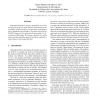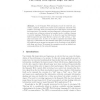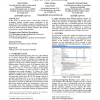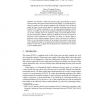126
Voted
WEBI
2005
Springer
15 years 8 months ago
2005
Springer
The realization of the Semantic Web needs a set of specialized middleware as its infrastructure. In this paper we describe the principles of tuplespace computing, explain why tupl...
117
Voted
WEBI
2005
Springer
15 years 8 months ago
2005
Springer
Automated methods for resource annotation are a clear necessity, as the success of the Semantic Web depends on the availability of Web resources with meta-data conforming to known...
133
Voted
SEMWEB
2005
Springer
15 years 8 months ago
2005
Springer
Abstract. We present a method for rapid development of benchmarks for Semantic Web knowledge base systems. At the core, we have a synthetic data generation approach for OWL that is...
145
click to vote
SEMWEB
2005
Springer
15 years 8 months ago
2005
Springer
Abstract. In the Semantic Web information would be retrieved, processed, combined, shared and reused in the maximum automatic way possible. Obviously, such procedures involve a hig...
121
click to vote
SEMWEB
2005
Springer
15 years 8 months ago
2005
Springer
We address the problem of linking observations from reality to a semantic web based knowledge base. Concepts in the biological domain are increasingly being formalized through ont...
97
Voted
SEMWEB
2005
Springer
15 years 8 months ago
2005
Springer
Due to the Semantic Web’s decentralised and distributed management, contradictory information is and will remain frequent. However, classical reasoning systems fail to work prop...
102
Voted
SEMWEB
2005
Springer
15 years 8 months ago
2005
Springer
The integration of heterogenous data sources is a crucial step for the upcoming semantic web – if existing information is not integrated, where will the data come from that the s...
115
click to vote
SEMWEB
2005
Springer
15 years 8 months ago
2005
Springer
In this poster, we present Oyster, a Peer-to-Peer system for exchanging ontology metadata among communities in the Semantic Web. Oyster exploits semantic web techniques in data re...
108
click to vote
SEMWEB
2005
Springer
15 years 8 months ago
2005
Springer
The Semantic Web Initiative envisions a Web wherein information is offered free of presentation, allowing more effective exchange and mixing across web sites and across web pages. ...
98
Voted
SEMWEB
2005
Springer
15 years 8 months ago
2005
Springer
Abstract. We introduce a framework, based on logic programming, for preferential reasoning with agents on the Semantic Web. Initially, we encode the knowledge of an agent as a logi...





